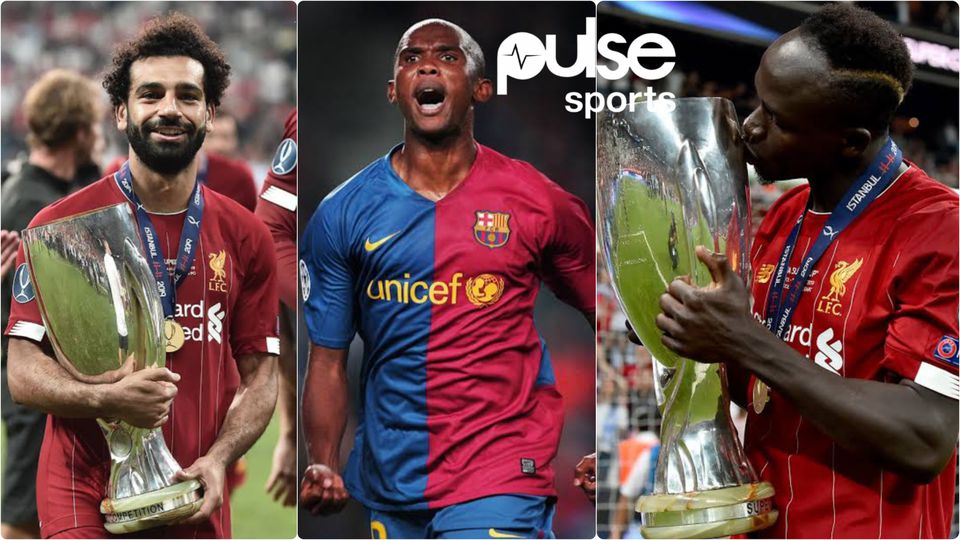The story of African Football Legends is written in glittering medals, era-defining performances, and moments that still make crowds draw breath. From Riyad Mahrez lifting five Premier League titles to Didier Drogba’s irresistible dominance, from Mohamed Salah’s record-breaking brilliance to Nwankwo Kanu’s artistry against the biggest opponents, African stars have left marks that time will not erase.
The Premier League honor roll that changed the game
Riyad Mahrez stands at the summit, a symbol of persistence and flair. The Algerian winger powered Leicester City’s fairy-tale run to the 2015 to 2016 title, then added four more with Manchester City in 2018 to 2019, 2020 to 2021, 2021 to 2022, and 2022 to 2023. His PFA Players’ Player of the Year crown in that historic Leicester season captured how a gifted dribbler with a keen eye for goal can transform a club’s destiny, a five title legacy that sets the standard for African champions in England.
Just beneath the summit is Didier Drogba, the benchmark for a modern centre forward. Chelsea’s talisman seized Premier League crowns in 2004 to 2005, 2005 to 2006, 2009 to 2010, and 2014 to 2015. His 29 league goals in 2009 to 2010, paired with two Premier League Golden Boots and two African Footballer of the Year awards, underline a career built on power, timing, and cold nerve in the defining moments, a four time champion whose presence lifted a club and a generation.
Yaya Toure reimagined midfield dominance, a colossus who drove Manchester City to three titles. The Ivorian arrived in 2010 and was instrumental in the dramatic 2011 to 2012 triumph, excelled in 2013 to 2014 with 20 league goals, then added 2017 to 2018. Four consecutive African Footballer of the Year awards from 2011 to 2014 tell you everything about a peak that blended power, technique, and leadership, a three title return that mirrored City’s rise.
Quinton Fortune’s story is a reminder that winning cultures need steady hands. The South African was a versatile contributor during Manchester United’s title runs in 1999 to 2000, 2000 to 2001, and 2002 to 2003. He was often a squad player, yet his reliability across midfield and defence made him part of a relentless era under Sir Alex Ferguson, a three time champion whose value was measured in trust.
The two title class with heavyweight moments
Mohamed Salah’s Premier League journey is both a tale of redemption and relentless excellence. After returning to England with Liverpool in 2017, he helped end the Reds’ 30 year wait in 2019 to 2020, then added another title in 2024 to 2025. The Egyptian holds the record for most Premier League goals by an African player, has three Golden Boots, two PFA Players’ Player awards, and two African Footballer of the Year honours, a record setting force whose consistency puts him among the league’s all time greats.
Kolo Toure’s medals tell a rare story of cross era success. He won the league with Arsenal’s Invincibles in 2003 to 2004, then added a second with Manchester City in 2011 to 2012. Few players have celebrated titles with two clubs, and Toure did it with the authority of a leader, a two club champion whose defensive assuredness translated across different teams and styles.
Arsenal’s Invincible tapestry also features Lauren, who locked down the right flank with defensive focus and consistency. He contributed to the 2001 to 2002 title, then was the uncontested first choice in the unbeaten 2003 to 2004 campaign. Often an unsung hero, the Cameroonian’s steady presence became a foundation for history, a reliable right back whose work rate empowered stars around him.
Michael Essien, the embodiment of drive and versatility, anchored Chelsea’s 2005 to 2006 and 2009 to 2010 triumphs. With a thunderous shot and a willingness to cover every blade of grass, the Ghanaian became a fan favourite, earned Chelsea’s Player of the Year in 2006 to 2007, and helped the club amass silverware that included the Champions League, a midfield engine built for high standards.
Mikel John Obi’s Chelsea tenure echoed with tactical discipline. Titles in 2009 to 2010 and 2014 to 2015 were built on his positioning, passing rhythm, and ability to disrupt opposition attacks. He was also part of the club’s historic 2011 to 2012 Champions League triumph, a screening midfielder whose value grew in the biggest tests.
Nwankwo Kanu’s two league titles with Arsenal, in 2001 to 2002 and 2003 to 2004, capture a forward who played with imagination and poise. Twice crowned African Footballer of the Year in 1996 and 1999, the Nigerian forward’s ability to conjure magic made him a cult hero in North London, a creative forward whose elegance was matched by impact.
Nwankwo Kanu and the art of the big stage
Kanu’s Premier League story stretches from February 1999 to May 2010, a run of 273 appearances and 54 goals across Arsenal, West Bromwich Albion, and Portsmouth. His goals were spread with a craftsman’s touch, five against Middlesbrough, four apiece versus Tottenham, Chelsea, and Bolton, then clusters of three and two across a wide cast of opponents, a decade long record that spoke to longevity and timing.
The night that best distilled his flair came at Stamford Bridge in December 1999, when Kanu scored a hat trick in 15 minutes to turn a 2 to 0 deficit into a 3 to 2 Arsenal victory. Years later, that performance still reads like theatre, bold touches, ice cool finishing, and an opponent stunned by a surge they could not stop, a hat trick that endures in Premier League folklore.
There were other signposts too. A debut brace for Portsmouth in a 3 to 0 win over Blackburn in August 2006 announced a fresh chapter, while more goals against Middlesbrough underscored how certain matchups can spark a player’s instinct. Even as he moved from North London to the Midlands and then the South Coast, Kanu kept finding the net against familiar names, a consistent finisher with an eye for the moment.
Fame, influence, and the modern African superstar
In 2025, the map of African football fame stretches from Cairo to Casablanca and from Dakar to Lagos. Mohamed Salah stands at the top, a cultural icon backed by tens of millions of followers and a medal haul that includes the Champions League and Premier League. He was named in Time’s 100 most influential people in 2019, a global figure whose reach extends far beyond Anfield.
Sadio Mané’s journey from Liverpool champion to Bayern Munich and Al Nassr is framed by profound national pride. He delivered the Africa Cup of Nations in 2022 for Senegal and is celebrated for building schools and hospitals in his hometown, a humanitarian star whose humility amplifies his football legacy.
Achraf Hakimi holds the spotlight as the most famous African defender of the moment. With Paris Saint Germain he helped win the treble in 2024 to 2025, while Morocco’s run to the World Cup semi finals in 2022 elevated him into a role model for young fans across continents, a modern full back who inspires on and off the pitch.
Riyad Mahrez, decorated in England and adored from Algiers to Jeddah, moved to Al Ahli in 2023 and continues to dazzle with silken control and measured crossing. His name carries the weight of that Leicester miracle and City’s relentless excellence, a technician whose artistry resonates worldwide.
Victor Osimhen is Nigeria’s marquee forward in 2025, a scorer with power, pace, and unmistakable charisma. He fired Napoli to a first Serie A title in over 30 years in 2023, then in Turkey delivered a league and cup double on loan at Galatasaray in 2024 to 2025 while finishing top scorer, before making the move permanent for 2025 to 2026, a marketable star whose following keeps growing.
Hakim Ziyech’s profile was forged in Champions League glory with Chelsea and lifted further by a stirring 2022 World Cup. Now at Al Duhail, his left foot remains a signature of precision and imagination, a creative playmaker familiar from Africa to the Middle East.
Goalkeeping royalty is well represented. Yassine Bounou, the calm presence behind Morocco’s World Cup 2022 semi final adventure, commands a vast following from Arab and African communities and now plays in Saudi Arabia, a penalty hero whose composure inspires trust.
Andre Onana’s journey from Ajax to a Champions League final with Inter Milan and into the glare of Manchester United speaks to a new breed of keeper comfortable with the ball and the spotlight. He remains one of the most talked about African goalkeepers in football history, a ball playing last line whose risk and reward define modern trends.
Edouard Mendy’s path, from uncertainty to Champions League winner with Chelsea and AFCON champion in 2022, is a story of persistence. Now in Saudi Arabia, his professionalism and consistency continue to draw admirers around the world, a respected figure whose journey inspires.
Mohamed Kudus, the Ghanaian creator whose long range goals lit up West Ham in 2023, took a new step with Tottenham ahead of 2025 to 2026. His flair and productivity have fueled a fast rising following, a rising star positioned to seize a bigger stage.
Nights on the continent and a special European stage
The UEFA Super Cup offers a single game, a shot of high stakes between European champions, and African players have embraced that spotlight. Sadio Mané lit up Istanbul in 2019 with two goals as Liverpool beat Chelsea, his speed and finishing a vivid display of a forward at full power, a two goal performance that sealed a European crown.
On that same night Mohamed Salah kept his nerve in the shootout, his successful penalty a symbol of cool under pressure and a reminder of how the Egyptian forward delivers in the moments that shape legacies, a calm finish on the grand stage.
Yaya Toure lifted the trophy with Barcelona in 2009 under Pep Guardiola, a midfield anchor who brought poise and strength to a team of luminaries. Riyad Mahrez added the Super Cup to his collection with Manchester City, another medal for a player who turns technique into silver, a continental triumph that complements domestic dominance.
Samuel Eto’o set a rare standard by winning the Super Cup twice, first with Barcelona in 2009, then with Inter Milan in 2010. His finishing, speed, and relentless drive helped fuel dynasties in two football capitals, a double winner whose name carries the weight of greatness.
Legacy, lessons, and the next chapter
Look across this tapestry and certain threads repeat. Leadership that lifts dressing rooms. Versatility that turns squad players into title winners. A consistent relationship with pressure that turns finals into platforms. From Mahrez and Drogba to Salah and Yaya, the Premier League became a canvas for African excellence, a lasting legacy that continues to inspire.
Look also to influence that stretches beyond 90 minutes. Mané’s philanthropic work, Salah’s cultural resonance, Hakimi’s role model status, Osimhen’s magnetism, these are the modern contours of superstardom. The fame rankings in 2025 are not just about followers and clicks, they are about how fans see themselves in these players, a connection that deepens the bond between pitch and community.
African footballers have not only conquered trophy lists, they have elevated the standards, raised the drama, and expanded what is possible for the next wave to believe.
And so the cycle continues. A young winger in Accra watches Mahrez glide past a marker. A keeper in Douala studies Bounou’s patience on penalties. A midfielder in Abidjan rewinds Yaya’s control of tempo. A forward in Lagos rewatches Kanu at Stamford Bridge and learns that, even when two goals down, the game still offers time for genius, a promise that tomorrow’s legends are already taking notes.





